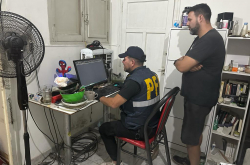ISTANBUL, Turkey – INTERPOL’s General Assembly has adopted a resolution addressing the challenges faced by law enforcement investigating cases of online child sexual exploitation and abuse.
Through the resolution, member countries expressed their concern at the increased use of end-to-end encryption (E2EE) to conceal illicit online crimes against children such as grooming, live streaming of sexual abuse and the distribution of child sexual abuse material.
E2EE is a privacy safeguard which ensures that the images, videos, written text and live communications are visible only to the sender and recipient. The use of E2EE prevents service providers from detecting child sexual abuse and from complying with lawful requests by law enforcement seeking to investigate cases, arrest offenders and remove child victims from harm.
With this in mind, AG-2021-89-RES-09 calls on member countries to urge E2EE providers to take responsibility for designing products and services which are inherently safe for children and ensure they are able to respond to legal requests to provide law enforcement with relevant information.
It also calls for national legislation and policy which enables law enforcement to prevent and respond to online child sexual abuse on these platforms.
The resolution, which was overwhelmingly endorsed by delegates, was initiated by the Republic of Korea and INTERPOL’s Crimes against Children unit, and developed by a multinational Working Party under the INTERPOL Specialists Group on Crimes against Children.
Yong Hwan Lim, Director General for Foreign Affairs of the Korean National Police Agency (KNPA), said: “Last year, the KNPA carried out a major investigation against a sextortion ring operating out of an E2EE platform. This newly-passed resolution is just one way to demonstrate that our fight against online child sexual exploitation does not end when a case is solved. The experience gained from this investigation led us to approach the international policing community - via INTERPOL - to make the digital space safer for children.”
Following its adoption, INTERPOL Secretary General Jürgen Stock said: “This issue is often presented as a zero-sum game, privacy versus child protection, but both can be protected. With safety by design, service providers can meet privacy obligations and also ensure that new technologies do not come at the cost of child safety.”
This resolution reinforces INTERPOL’s long-standing commitment to combating offences against children, and adds to previous resolutions related to this crime area:
- Resolution AG-2014-RES-02 improving international notifications and information sharing regarding travelling child sex offenders by using INTERPOL’S green notices (2014);
- Resolution AG-2011-RES-08 promoting victim-centric management of child abuse material at the national level (2011);
- Resolution AG-2011-RES-05 addressing online child sexual abuse through a legislative global engagement strategy (2011).
- Resolution AG-2009-RES-05 combating exploitation of children on the internet using all available technical solutions, including access blocking (2009);
- Resolution AG-2005-RES-09 addressing websites offering child sexual abuse material and trafficking of children on the Internet (2005);
- Resolution AGN/65/RES/9 addressing the production, distribution and possession of child sexual abuse material (1996);
- Resolution AGN/65/RES/10 addressing the improvement of international police cooperation in combating offences against children (1996).










